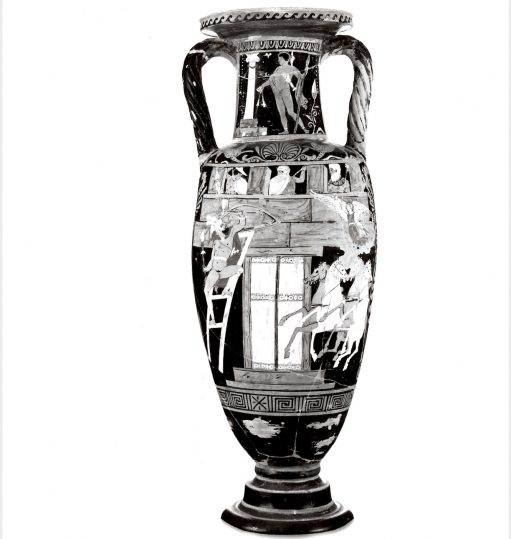Italy
Composed: ca. 80-92 CE
First published: 91 or 92 CE
Publius Papinius Statius,
Thebaid
(Thēbaïs)
Statius’s Thebaid relates the strife of two brothers, Polynices and Eteocles, the sons of Oedipus, who struggle for control of an Ancient Greek city. The myth of the founding of Thebes comes earlier, how armed soldiers sprang up from the furrows Cadmus plowed, creating discord and civil war.
The story of Antigone comes after, the subject of Sophocles’ tragedy about a woman caught between the law of men – Creon’s decree that she not be allowed to bury her brother Polynices – and a higher morality, which demands that she tend her brother’s body. Statius’s subject, however, is neither the raw force that underlies civility nor the moral blindness of human lives but rather the sad horror and inevitability of conflict.
The Thebaid is not about society as it develops – the emergence of civilization, order, and language as they overpower brute violence and political chaos – but the stress lines of the modern: the return of repressed violence and the fragmentation of culture. There is, it seems, such a thing as too much success, as well as too much failure, whether in Rome two thousand years ago or today. Even unopposed power may be uneducated, unsteady, liable to new problems but old emotions. Humans are self-destructive; anger comes easily.
Writing in a rhetorical style that stressed the emotions, Statius says that his “task is to give length to lives” (4.33; line numbers refer to the Latin text), and to do so he postpones the mutual slaughter of Polynices and Eteocles until almost the end of the poem. He replays, in his own style, many motifs that he drew from Virgil’s Aeneid. In that earlier Roman epic, the goddess Juno tries to delay the founding of Rome but her efforts are thwarted by fate. Nonetheless, Virgil is always economical; his story moves forward briskly. Statius, by contrast, prefers to linger. The provocation that drives the Argives to war occupies the Thebaid for three books. Some years then pass before the beginning of book 4, where Statius first catalogs the forces of the seven against Thebes and almost at once inserts the most pronounced digression in the poem: Bacchus, the god of wine, causes a drought that impedes the Argive advance on his hometown. The tactic Bacchus announces – “meanwhile I will use fraud to weave delay” (4.677) – resembles Statius’s own technique, for Statius relishes the story of Hypsipyle, who first leads the Argives to water, then recounts the saga of Lemnos (book 5), where the women slaughtered their men. The death of Archemorus requires lengthy funeral games (book 6) before the war can be resumed. The story that follows these delays is somewhat similar to the plot of the film The Magnificent Seven: a sequence of assaults by seven heroes, each with a unique personality. Most of the heroes die; there is a final battle, and then an outside intervention. Like the Thebaid, Hollywood’s postwar epic seems to represent history’s winners. Seven American cowboys ride into Mexico to free a small town from bandits. The good guys succeed, yet they are oddly troubled by their profession: they long to hang up their guns and find stability, a family, a place to settle. The film imitates, often very closely, The Seven Samurai, made in 1954 by Akita Kurosawa. The Japanese film maker, like Statius, understood what it meant to live in the wake of the grim victories that established the imperial state. It is so easy to go awry.
We too move hesitantly into the future, the new world order, and it may be that Statius’s art of passion, delay, and extension provides some form of guidance. His poetry combines horror and grace, war and romantic variety. Its sheer intensity still speaks to us, if we listen.
Charles Stanley Ross
Purdue University
Excerpt from: Introduction to Publius Papinius Statius, The Thebaid: Seven against Thebes, translated by Charles Stanley Ross (Johns Hopkins University Press, 2004), pp. x-xi.
Resources
Edition in English:
Statius, Publius Papinius. Thebaid: Seven against Thebes. Translated by Charles Ross. Johns Hopkins University Press, 2004.

